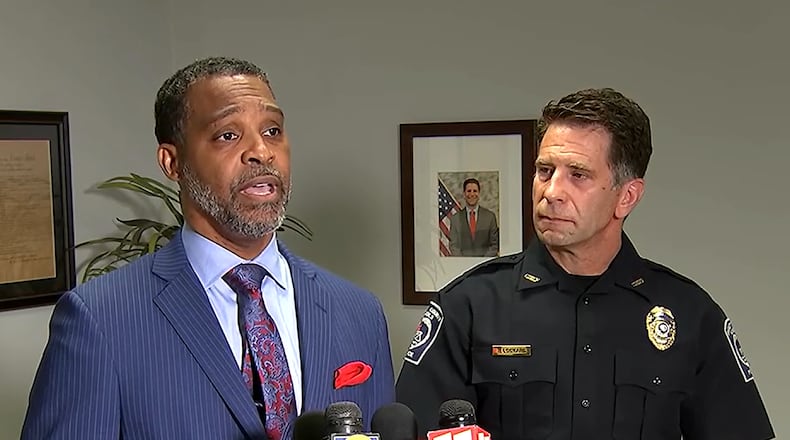More than 100 students across the state were charged with crimes related to making threats of violence against schools in the two weeks after the deadliest school shooting in Georgia’s history.
Amid the deluge of threats following the Sept. 4 shooting at Apalachee High School, one of Georgia’s top Republican lawmakers said he wants to increase penalties for people who threaten schools.
“We cannot allow these irresponsible and unsubstantiated threats to divert valuable time and resources from local law enforcement and school resource officers,” Georgia House Speaker Jon Burns, R-Newington, said in a letter after the shooting.
Students in Georgia already face disciplinary, criminal and financial consequences for making threats. Burns and his staff have yet to say what changes they want to make, but they indicate changes are coming.
After a 2023 school shooting in Nashville, Tennessee, lawmakers in that state passed legislation requiring the expulsion of students who make threats and charging them with a felony. School safety experts, though, question the zero-tolerance approach.
“All threats should be treated seriously,” said Ken Trump, a consultant who’s worked in school security for 40 years. “All threats should be investigated thoroughly. But the consequences should be based upon the facts and details. It has to be based on a case-by-case basis.”
Threats in Georgia schools
An Apalachee High student is charged with shooting and killing two 14-year-olds and two teachers at the school northeast of Atlanta on Sept. 4. Of the 117 arrests in the state related to making threats in the following two weeks, all but two involved juveniles. The youngest was 11, and the bulk of the threats were shared on social media.
One 12-year-old called a 911 operator to make the threat, Crisp County authorities said. Several were bomb threats. One student falsely claimed that another student had a gun. Another is accused of writing in a note, “I’m shooting the school.”
The New York Times reported more than 700 students across the country were arrested and accused of making violent threats against schools in the three weeks following the Apalachee High shooting.
“I’m sure it’s just barely scratching the surface,” Trump said. “There’s a very clear pattern of school threats after high-profile school shootings.”
The “contagion effect” usually lasts two to three weeks, experts say. People make threats that they often have no intention of following up on. But law enforcement and school officials must treat each threat like it’s real.
Case-by-case basis
In Gwinnett County, the state’s largest school district, 20 students were arrested for allegedly threatening violence at school, making false claims or, in at least one case, bringing a weapon to school in the two weeks after the Apalachee High shooting.
In those cases, the Gwinnett County District Attorney’s Office said its top priority is to make sure those students get a psychological assessment and implement any recommendations that come from that assessment. The office’s goal is to make sure the students are rehabilitated, said Cynthia Chen, the assistant district attorney who manages Gwinnett’s juvenile division.
Under Georgia law, those convicted of making a terroristic threat — which many of the students arrested across the state were charged with — can face jail time, a criminal record and fines. Juveniles usually face a maximum of 24 months of probation and 30 days in a detention center — but detention is something Chen said is carefully considered.
“I am very aware when I ask a judge to put a child in a detention facility that they’re going to come in contact with gang members, they’re going to come in contact with youth who have committed armed robberies, with youth who are charged with murder,” Chen said. “And if that is going to make things worse, then maybe that’s not something I want to ask the judge to do.”
Chen and Gwinnett District Attorney Patsy Austin-Gatson said they value the flexibility they have in determining how to proceed after a student is charged with making a threat. A juvenile’s intent, their psychological evaluation, their age — all of those provide important context for deciding how to respond.
“I don’t think added punishment ever deters people from committing offenses,” Austin-Gatson said.
The future of threat response in Georgia
In the coming years, students who make threats could face even harsher penalties.
“The House remains committed to exploring legislative measures that create uniformity in the penalties for individuals who make terroristic threats against our schools,” a spokesperson for Burns, the Georgia House speaker, said in a statement. “Throughout the 2025 session, the House will continue to seek solutions that reflect the severity of these actions while ensuring the well-being of students who may be struggling with mental health issues.”
Burns was not available to speak with The Atlanta Journal-Constitution about what, specifically, he would propose. But other states have already started down the same road.
After six people were killed at The Covenant School in Nashville in March 2023, Tennessee lawmakers passed laws that required the expulsion of any student who made a “valid” threat and another law that required students who make threats of any kind be charged with a felony. Tennessee state representative Bo Mitchell, a Democrat who co-sponsored the bill to require students be charged with a felony, said it felt like an important step to him because threats disrupt schools and can traumatize other students.
“I live in a state where they’re not gonna do what’s necessary to solve the problem about gun violence,” he said in an interview with the AJC. “But we need to at least do something about these threats for our children if we’re not going to do anything else.”
Expulsions for school threats nearly doubled — from 22 in the 2022-23 school year to 42 in 2023-24 — in Metro Nashville Public Schools after the new law went into effect, one news outlet reported. In Rutherford County Schools, a school system southeast of Nashville, there was a 450% increase in expulsions for threats.
Additionally, ProPublica and Nashville Public Radio have reported that since the laws took effect, a 13-year-old student with autism was arrested over a misunderstanding about a stuffed animal in his backpack; police arrested an 11-year-old at a family birthday dinner at a LongHorn Steakhouse over a threat he denied making; and a 10-year-old was expelled for pointing his finger in the shape of a gun at school.
Mitchell said the felony law wasn’t aimed at students making pranks, but it may be something lawmakers need to clarify.
“Adding legislation does not mean that it’s good legislation or helpful legislation,” Trump said. “There can be unintended consequences.”
AJC data reporter Jennifer Peebles contributed to this article.
How we got the story
The Atlanta Journal-Constitution counted 117 people in 37 counties who were charged with crimes related to making threats about a school.
Reporters reviewed press releases, reports from other news outlets and spoke directly to school districts and law enforcement agencies to count the arrests.
Credit: Photo courtesy GBI
Credit: Photo courtesy GBI
Credit: HYOSUB SHIN / AJC
Credit: HYOSUB SHIN / AJC
About the Author
Keep Reading
The Latest
Featured




